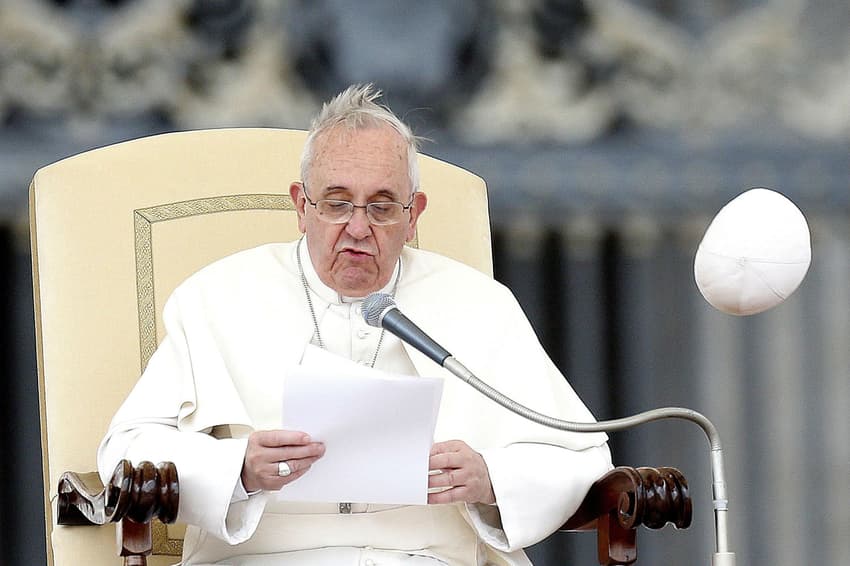'Celibacy is not a dogma': German Catholic Church to examine practices

The German Catholic Church vowed Thursday a thorough look at its practices including the issue of celibacy, in a shakeup of the system following a damning child sex abuse scandal.
In the latest of a series of sex assault scandals to rock the Catholic Church worldwide, the German institution this week published a study showing that at least 3,677 minors were abused by clergy between 1946 and 2014.
Cardinal Reinhard Marx, who heads the German Bishops' Conference, apologized to the thousands of victims and promised to leave no stone unturned in dealing with the problem plaguing the church.
Speaking at the close of a three-day meeting of top clergy in Fulda, Marx stressed that "no topic would be taboo".
Rather, he promised a broad discussion that would also examine questions on celibacy and the church's sexual morals.
With allegations battering the Church from the United States to Chile to Australia, voices calling on Pope Francis to abolish celibacy for priests have grown louder.
A five-year inquiry in Australia into the widespread child sex abuse affecting 15,000 people recommended that celibacy among Catholic priests should be voluntary to help curb abuse.
Pope Francis has said that "celibacy is not a dogma", and that the church may consider ordaining married men to work in areas faced with a shortage of priests.
But the Vatican does not yet seem ready to take the step of ending the practice.
In Germany, the researchers from three universities who carried out the study on the extent of sexual misconduct by priests said the true scale of the abuse was far greater, as many documents had been "destroyed or manipulated".
They have also warned that "sexual abuse is a persistent problem" in the Catholic Church and presumably ongoing, "not a historical problem".
Predator priests were often transferred to other parishes that were commonly not warned about their criminal history.
Only about one in three were subject to disciplinary hearings by the Church, and most got away with minimal punishment. Only 38 percent were prosecuted by civil courts.
Comments
See Also
In the latest of a series of sex assault scandals to rock the Catholic Church worldwide, the German institution this week published a study showing that at least 3,677 minors were abused by clergy between 1946 and 2014.
Cardinal Reinhard Marx, who heads the German Bishops' Conference, apologized to the thousands of victims and promised to leave no stone unturned in dealing with the problem plaguing the church.
Speaking at the close of a three-day meeting of top clergy in Fulda, Marx stressed that "no topic would be taboo".
Rather, he promised a broad discussion that would also examine questions on celibacy and the church's sexual morals.
With allegations battering the Church from the United States to Chile to Australia, voices calling on Pope Francis to abolish celibacy for priests have grown louder.
A five-year inquiry in Australia into the widespread child sex abuse affecting 15,000 people recommended that celibacy among Catholic priests should be voluntary to help curb abuse.
Pope Francis has said that "celibacy is not a dogma", and that the church may consider ordaining married men to work in areas faced with a shortage of priests.
But the Vatican does not yet seem ready to take the step of ending the practice.
In Germany, the researchers from three universities who carried out the study on the extent of sexual misconduct by priests said the true scale of the abuse was far greater, as many documents had been "destroyed or manipulated".
They have also warned that "sexual abuse is a persistent problem" in the Catholic Church and presumably ongoing, "not a historical problem".
Predator priests were often transferred to other parishes that were commonly not warned about their criminal history.
Only about one in three were subject to disciplinary hearings by the Church, and most got away with minimal punishment. Only 38 percent were prosecuted by civil courts.
Join the conversation in our comments section below. Share your own views and experience and if you have a question or suggestion for our journalists then email us at [email protected].
Please keep comments civil, constructive and on topic – and make sure to read our terms of use before getting involved.
Please log in here to leave a comment.